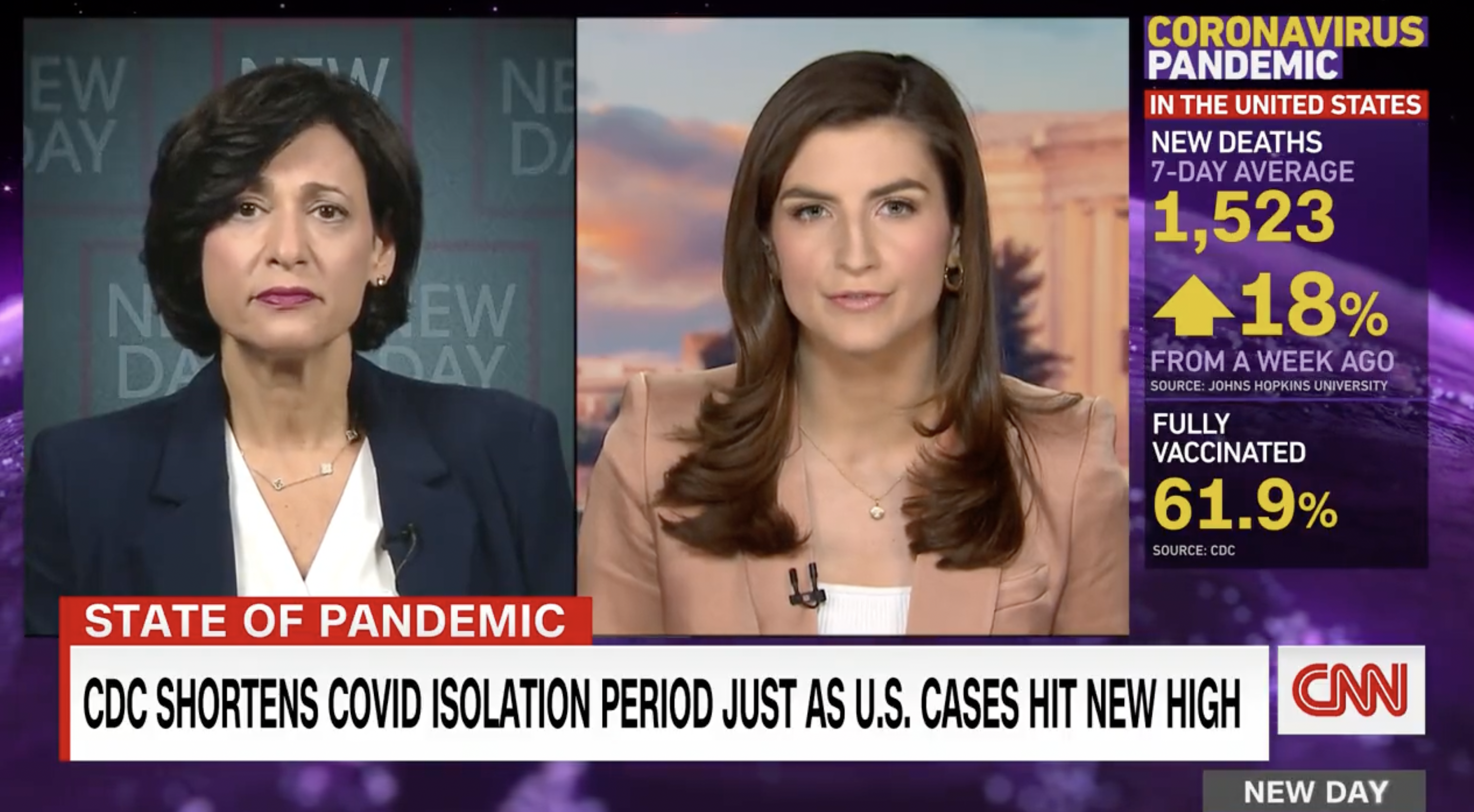CDC director addresses criticism over new COVID-19 isolation recommendations


A free daily email with the biggest news stories of the day – and the best features from TheWeek.com
You are now subscribed
Your newsletter sign-up was successful
The director of the Centers for Disease Control and Prevention is defending new COVID-19 isolation guidelines after criticism that a negative test result recommendation should have been included.
CDC Director Rochelle Walensky appeared on several morning shows Wednesday to explain why the agency earlier this week reduced the recommended isolation time for people who test positive for COVID-19 from 10 days to five days if they're asymptomatic. Some experts criticized the guidelines, arguing the CDC should recommend obtaining a negative test result prior to leaving isolation.
Walensky addressed this criticism on CNN, saying the agency decided not to recommend a rapid test to leave isolation because "we actually don't know" how well rapid tests "predict whether you're transmissible during the end of disease." She added that regardless of whether a rapid test at the end of isolation is negative or positive, the CDC's recommendation either way would be to wear a mask, and so "given that we were not going to change our recommendations based on the result of that rapid test, we opted not to include it."
The Week
Escape your echo chamber. Get the facts behind the news, plus analysis from multiple perspectives.

Sign up for The Week's Free Newsletters
From our morning news briefing to a weekly Good News Newsletter, get the best of The Week delivered directly to your inbox.
From our morning news briefing to a weekly Good News Newsletter, get the best of The Week delivered directly to your inbox.
The new guidelines were made based on the fact that "about 85 to 90 percent of viral transmission happens in those first five days," and "we want to be able to get people back out if they're feeling well," Walensky told CBS This Morning, adding the decision had "nothing to do with" rapid tests being difficult to find in some parts of the country. The CDC is still recommending that those exposed to COVID-19 get tested on day five "if possible."
On CNN, Walensky also said the CDC took into account "what we thought people would be able to tolerate," noting "we have seen relatively low rates of isolation" during the pandemic and that the agency wanted to ensure it had guidelines in place that "people were willing to adhere to."
A free daily email with the biggest news stories of the day – and the best features from TheWeek.com
Brendan worked as a culture writer at The Week from 2018 to 2023, covering the entertainment industry, including film reviews, television recaps, awards season, the box office, major movie franchises and Hollywood gossip. He has written about film and television for outlets including Bloody Disgusting, Showbiz Cheat Sheet, Heavy and The Celebrity Cafe.
-
 The environmental cost of GLP-1s
The environmental cost of GLP-1sThe explainer Producing the drugs is a dirty process
-
 Nuuk becomes ground zero for Greenland’s diplomatic straits
Nuuk becomes ground zero for Greenland’s diplomatic straitsIN THE SPOTLIGHT A flurry of new consular activity in Nuuk shows how important Greenland has become to Europeans’ anxiety about American imperialism
-
 ‘This is something that happens all too often’
‘This is something that happens all too often’Instant Opinion Opinion, comment and editorials of the day
-
 A Nipah virus outbreak in India has brought back Covid-era surveillance
A Nipah virus outbreak in India has brought back Covid-era surveillanceUnder the radar The disease can spread through animals and humans
-
 Trump HHS slashes advised child vaccinations
Trump HHS slashes advised child vaccinationsSpeed Read In a widely condemned move, the CDC will now recommend that children get vaccinated against 11 communicable diseases, not 17
-
 Covid-19 mRNA vaccines could help fight cancer
Covid-19 mRNA vaccines could help fight cancerUnder the radar They boost the immune system
-
 FDA OKs generic abortion pill, riling the right
FDA OKs generic abortion pill, riling the rightSpeed Read The drug in question is a generic version of mifepristone, used to carry out two-thirds of US abortions
-
 The new Stratus Covid strain – and why it’s on the rise
The new Stratus Covid strain – and why it’s on the riseThe Explainer ‘No evidence’ new variant is more dangerous or that vaccines won’t work against it, say UK health experts
-
 RFK Jr. vaccine panel advises restricting MMRV shot
RFK Jr. vaccine panel advises restricting MMRV shotSpeed Read The committee voted to restrict access to a childhood vaccine against chickenpox
-
 Texas declares end to measles outbreak
Texas declares end to measles outbreakSpeed Read The vaccine-preventable disease is still spreading in neighboring states, Mexico and Canada
-
 RFK Jr. shuts down mRNA vaccine funding at agency
RFK Jr. shuts down mRNA vaccine funding at agencySpeed Read The decision canceled or modified 22 projects, primarily for work on vaccines and therapeutics for respiratory viruses
